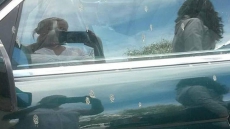VANCOUVER — An endangered orca's "tour of grief" is over after she spent nearly three weeks towing her dead calf around the Pacific Ocean, researchers said Sunday.
The Center for Whale Research said the killer whale, known as J35, was spotted off the western coast of San Juan Island, Wash., without her baby while she chased a school of salmon with her podmates for about a kilometre.
The behaviour displayed by J35 has many researchers stumped.
Dr. Martin Haulena, the chief veterinarian at the Vancouver Aquarium, said a one- or two-day "mourning period" is common in many cetacean species such as whales and dolphins, but the 17-day-long journey was distinctly strange.
"No one really knows why moms carry their calves to begin with," said Haulena from his home in Point Roberts, Wash. "These kinds of things are very hard to talk about or prove."
Haulena said when cetaceans give birth, the mothers will typically "slipstream" behind the calf and push it toward the surface, ensuring it will get air. When calves are stillborn or die shortly after birth, Haulena said the mothers instinctively drive the calf upward, and may continue to do so for 48 hours.
He said while it may appear J35 is displaying human-like emotion, it's too difficult to distinguish between actual animal emotions and what humans project onto them.
"I think sometimes we dishonour animals by giving them human feelings, or human rules and laws," said Haulena.
"You can't judge another species by that."
The centre says J35 appears to be in good health based on telephoto images, in spite of concerns she may not have been able to forage for food while carrying around the carcass.
The centre said the carcass likely sank to the bottom of the Salish Sea, and researchers may not get a chance to perform a necropsy.
Paul Cottrell with Fisheries and Oceans Canada was audibly relieved to see J35 release the calf and return to her regular activities such as hunting.
"We're really happy. It's so important that J35 does move on and it took a long time," said Cottrell in a phone interview from Vancouver.
He added that members of his department and a non-governmental organization called Straightwatch would be out on the waters between Vancouver and San Juan Islands to track the pod of whales known as J Pod should they cross back into Canadian waters, keeping any ships in the area away from the orcas.
Cottrell said the cross-border collaboration with their American counterparts has been very successful.
"The population (of orcas) is both Canadian and American in terms of moving back and forth, so it's been a real coordination between governments, NGOs, and also the research community," he said.
J35 was spotted by Fisheries and Oceans Canada while they were searching for another of the 75 southern resident killer whales, which are labelled an endangered species in both Canada and the United States.
Her calf was born and died on July 24, and researchers say she towed it around for more than 1,500 kilometres.
Haulena said the public interest in J35's journey was gratifying for the veterinarian.
"It's just really neat to see how much people care, and how much people are concerned, and the sense of stewardship people have for their environment around them, particularly here in B.C.," said the veterinarian.
"I'm really proud."



